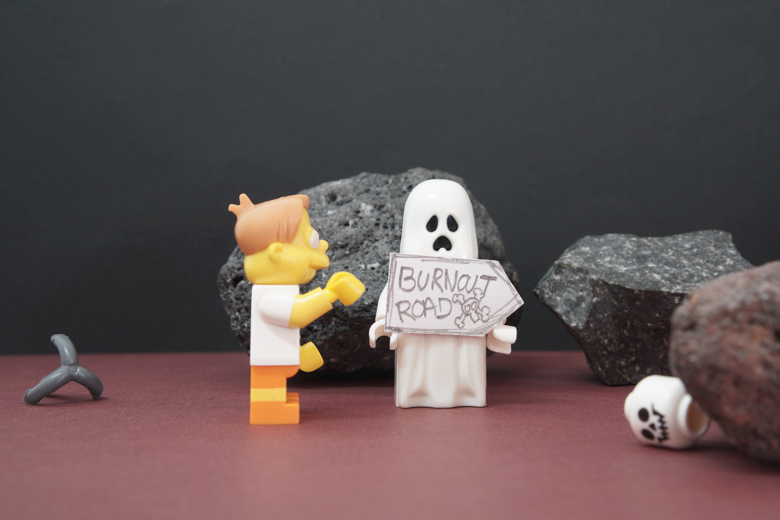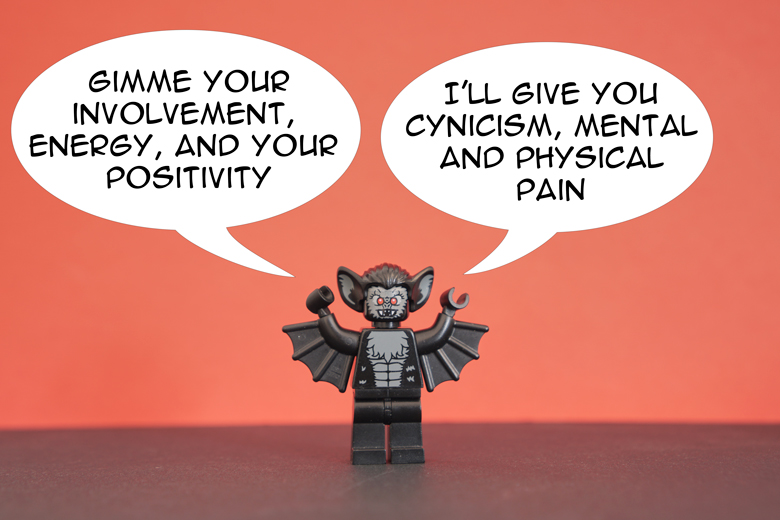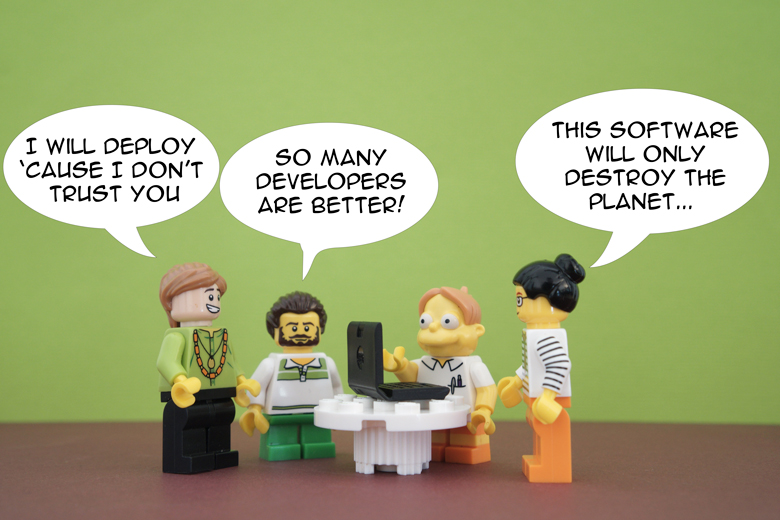
I heard many developers having strong opinions about burnout. Something like: “I’m not the kind of person to burnout! I know how to manage my stress. I know how to manage challenges. I’m in the control of my life.”.
Only the others are victim of burnout until it hit you. I experienced a severe form of burnout at the beginning of my career, as I was mentioning in this article about stress. I was exhausted, angry, and I had strong physical symptoms, including dizziness and headaches.
I had to stop working for months to come back to a normal state of mind. From there, I became interested in the topic by reflecting on my own experience and by witnessing other colleagues having the same problems.
Obviously, I’m not an isolated case. From 1974 to 2008, no less than 6000 different resources (books, articles, and videos) were made on the subject. Some studies reported a burnout prevalence rates up to 69% in a given population (30% in teachers and 31% in medical students, for example).
I would like to share with you what my researches on the subject taught me as well as my experience. We’ll see more precisely:
- What burnout is.
- The possible burnout syndromes you might experience.
- The common causes of burnout. Spoiler ahead: it’s not only overwork.
- Tactics to prevent burnout.
I see burnout as a road which gets more and more desolated as you go forward. This road lead to the Cave of the Burnout Vampire, which can suck your motivation and your mental energy for months.
Burnout is more of a spectrum than a binary state. If you are at the very beginning of the Burnout Road, you have a mild burnout condition. If you are in the Cave of the Burnout Vampire, you have a severe one.
On this delightful and bucolic description, let’s look at the Burnout Road from above.
What is Burnout?

Once Upon a Time…
It’s important to understand how people came to speak about burnout before trying to define it. In general, if you want to really understand why something is what it is today, looking at its history is always interesting. It’s true for technologies too.
The concept of burnout was first described by the psychologist Herbert Freudenberger in 1974. Interested by the topic, he conducted studies on his own colleagues (medical practitioners) to find more about it.
Professor Christina Maslach and her colleagues then took over his studies in the late 1970s and early 1980s. She’s still considered the most preeminent scholar in the field. She extended burnout studies to other profession out of the medical and social spheres. More precisely, she studied professions requiring creativity, problem solving, or mentoring. The kind of work a developer would do.
Her studies show that burnout is a preeminent and worldwide problem.
Despite these results, the definition of burnout is still a fiercely debated topic among psychologist and medical practitioners. Many countries still don’t recognize burnout as a valid diagnosis. That said, the World Health Organization (WHO) accepted burnout as an “occupational phenomenon” (and not a medical condition) on the advice of many health experts around the world in May 2019.
Defining Burnout
According to the World Health Organization:
Burnout is a syndrome conceptualized as resulting from chronic workplace stress that has not been successfully managed.
Indeed, the burnout condition is always linked to your job. The definition speaks about chronic stress too: it’s more than a bad day, it’s something which happens repeatedly.
Everybody responds to chronic stress more or less differently. Freudenberger found that the dedicated and the committed employees have more chance to burnout. According to him, they have “significant amount of emotional work and empathy, personal involvement, and intrinsic motivation”.
It makes sense: if you’re involved in your work but the work environment doesn’t seem to notice or is hostile to your efforts, you’ll become more and more frustrated and disillusioned. This can happen quickly if you work in a working environment which is too chaotic or authoritative for example.
There are two important things which can lead burnout:
- Your own personality.
- The environment you work in.
But the working environment weight more in the burnout balance than the personality, as suggested by this study(see Causes and Outcomes).
It can explain why burnout is going through the roof the last decades for some type of jobs, like software development, touching all kind of personalities and hierarchical levels, from developers to C-level managers.
The Burnout Symptoms

The longer you’ll walk along the Burnout Road, the stronger the symptoms described here will become. Learning to detect them early is a valuable skill for you to take action and prevent the burnout to happen.
Positive Involvement Become Cynicism
If you felt involved in your company and this involvement let place to cynicism, something went wrong. Be attentive to these signs:
- You begin to criticize often your colleagues, your clients, or your managers, for their behaviors and their decisions.
- You have the impress that the quality of your work decrease and your colleagues think the same (if they don’t, it could be the imposter syndrome).
- Your motivation is low and you begin to do the least amount of work for any given task.
These are clear indicators that you’re in the Poisonous Land of Cynicism.
No Sense of Accomplishment
If you think that the work you’re doing is useless, you have lost your sense of accomplishment.
We need clear and motivating goals to feel useful. If you spend most of your day wondering why you’re doing what you’re doing without finding any answer, it’s a clear sign pointing to Burnout Hell.
Your Energy Is Gone
In the past, you had a good amount of energy throughout the day. Now, it seems to be gone. When you wake up the morning to go to work, you feel already exhausted. You didn’t throw a big party or smoked anything illegal, but the mental fog you’re in is real.
There are multiple levels of exhaustion:
- You won’t feel like going to work from time to time.
- You won’t feel like going to work every single day.
- In a more serious burnout state, you might have dizziness, headaches or stomach cramps only by thinking to go to work.
Exhaustion is a strong sign that your burnout is real. Some studies suggest that it’s a mandatory ingredient to launch you on the Burnout Road.
Negative Emotions
Negative emotions about your work and your colleagues can lead you into a vicious circle. The more negative emotions you’ll have, the more you’ll blame your company to be the cause of your negativity, which will create even more negative emotions.
These negative emotions will affect your mood and, with enough time, you’ll unleash your anger on the ones you love without being able to control it.
The Physical Symptoms of Burnout
Freudenberger characterized burnout with physical symptoms such as:
- Physical exhaustion and muscle pain.
- Fatigue.
- Frequent headaches.
- Gastrointestinal disorders.
- Sleeplessness.
- Dizziness.
- Shortness of breath.
These are the symptoms for chronic stress too.
The Causes of Burnout

What are the mental consequences of all these symptoms, bringing you step by step into the Dark Cave Of The Burnout Vampire? Some studies suggest that you need at least three of them to experience the most severe form of burnout. Here’s a very effective recipe to reach this corner of hell:
- Take multiple causes, or one cause with high intensity.
- Add enough time.
- You feel very bad, don’t you?
- More time!
- You have now the most severe form of burnout.
When you begin to walk the Burnout Road, it might seem normal to feel that way. You don’t really want to go to work every day but you need to pay the bills. This will be even worst if you’ve some strong feelings of imposter syndrome. This is a dangerous trap, because you won’t realize that your mental health is declining until it’s too late.
Overworking / Over-commitment
There are many misconceptions or incomplete information about burnout. The ones I see the most often are these two:
- Burnout is only about overwork.
- If somebody experiences a burnout, working less is the solution.
It’s true that exhaustion is an important cause of burnout, but it’s not the only one. Working less won’t solve magically a burnout, at least not entirely. If you work a lot because you love what you’re doing, for example, you might feel exhausted after a while, but not burnout. But if you have other burnout symptoms going on, they will continue to evolve and poison your life.
Furthermore, you can have a normal workload and experience burnout anyway.
Let’s not forget that programming is isolating. If you work non-stop, you will spend your days alone. You won’t have social interactions, or very dull ones since your brain will constantly be busy trying to solve problems, instead of having relaxing conversations. If you’re reading this in the middle of a pandemic, it’s even worse.
People have tendencies to only trust what they see. But the idea of a developer only working when he’s behind his computer is absurd. Bugs and features stays in our brain even when we’re doing something else. As a consequence, it’s not always easy to see if a developer is overworking.
Lack of Control and Autonomy
A lack of control and autonomy can be the source of strong burnout symptoms.
Lack of Trust
It’s easy to see if your managers don’t trust you:
- They’re always looking at every single commit you’re doing to be sure you’re working.
- You don’t have the authorization to do many things. Deploying on pre-production or production, for example, is forbidden.
- The management think that employees don’t work when they are out of the office. Home office is therefore impossible.
This list is far from being exhaustive, but it’s a good beginning. If your managers don’t trust you, that’s a huge problem you won’t be able to solve.
Micromanagement
You’ll recognize micromanagement when somebody will try to take all the decisions for you and question the ones you’ve already taken, systematically.
This can be due to a lack of trust. Some managers think, since they are “above” you in the hierarchy, that they can do everything they want and make everything you do their own. They want a total control on you and what you’re doing. “We have to do that because I said so” will be their mantra.
It can even be more subtle: they might listen to you but never take any action. They might not let you experimenting with your ideas too.
What are the consequences, you might ask? A lack of control and autonomy is a comfy nest for chronic stress. It also means that you won’t learn a lot either. We need to explore, experiment, and make mistakes for that.
Your Colleagues
We’re working most of our lifetime; our coworkers affect significantly our lives as a result. Human interactions can bring the best and, unfortunately, the worst. Some examples:
- Unsolved conflicts haunting your thoughts.
- Bullying.
- Power abuse.
- Harassment.
- Absence of (positive) feedback.
- Ultra competitive colleagues.
If you really don’t get along with your colleagues, even after honestly trying, you’ll have difficulties to wake up every morning to work with them. If you have more severe problems like harassment or bullying, run away from your current job.
Absence of Fairness
Companies’ management can be very good to create competition among employees, sometimes without even knowing it. They reward some “talents” because of visible achievements they’ve accomplished, forgetting other employees who might bring value more quietly.
An example: some managers out there will compliment employees because “they stay late at work” or because “they did a wonderful job on the buttons of the login form”. They forget that:
- Staying at work late doesn’t mean producing business value or even quality code; quite the contrary, in my experience. Overwork has never been a synonym of quality.
- Knowledge workers are working with their brains. This doesn’t necessarily happen behind a computer in an open office.
- It creates feelings of jealousy and unfairness.
Again, if you’re a manager, keep in mind that work is not always something visible. Rewards and feedback should be given personally, and employees shouldn’t feel compared to others systematically.
If you’re managing people, reward honestly every single developer on your team and show them that you know what they’re doing, that you care, and that you’re thankful about it.
Safety, Values, and Entropy
Psychological Safety
Psychological safety needs to be ensured in a company. It means that you are not afraid to express yourself, to experiment, to make mistake, and to be wrong.
Everybody should thrive to create a generative company culture, where:
- The focus is on good results.
- The risks are shared.
- Failures are accepted and thought upon.
- Experimentations and mistakes are understood and respected.
On the other side of the spectrum, some company cultures are power oriented (do-what-I-say-because-I’m-the-boss style), with a lot of:
- Politics.
- Distorted information.
- Fear.
- Threats.
Remember: the culture a company aims for (and generously speak about during the recruiting interviews) can be very different from reality. Company culture is built from employees and employers actions, not from what they’re saying.
Values
Another thing carried by a company culture are the company’s values themselves. What’s the mission of the company? Why do they want to grow their business?
The difficulties come when your values mismatch the ones from your company. Let’s imagine you love polar bears because they’re cute, but unfortunately you’re working for a massive gas company which destroy the environment, including the poor bears. Would you feel motivated to work for them, every single day?
Everybody has values, even if you have the impression that Dave, your colleague developer, doesn’t care about anything except new overpraised technologies and trends. This is a value by itself. If your company don’t want to use the new cool stuff, even with good reasons, Dave might close himself in a world of sorrow and pain.
Company Entropy
A company can also be so chaotic that their values and objectives are blurry. One day they will do this because it’s trendy, the other day a concurrent will do the contrary, so they’ll follow. An absence of long term vision and direction will confuse everybody.
Often, you won’t even know if your work is useful, since nobody will dare give you any honest outcomes of your work. This will damage your motivation and your commitment.
Preventing And Recovering From Burnout

Nobody wants to burnout. Preventing is better than healing, so what can we do to prevent it?
Let’s say that you’re more and more tired, you recognized yourself while reading the burnout symptoms, you see some causes which match some aspect of the culture of your company. What can you do?
Acting on the Environment
Now that we know the main causes for a burnout, you can try to find the most obvious ones in your company. You need to be able to explain them and to illustrate them with concrete examples. The first step to solve a problem is to define it.
If you work with a couple of colleagues you trust, speak about your discoveries with them first. If they agree with you and share your feelings, it’s likely that you might not be the only one on the Burnout Road.
Social support can help tremendously. If there’s something you should take away from this article, grab this one: don’t isolate yourself.
Then, speak about your concerns with your managers. Be honest. Even if developers can feel ashamed about burning out, keeping the silence won’t help anybody. Heck, speaking about it might even help the whole industry and encourage other developers to follow your path! You can see it as another problem which needs to be solved.
Speak about the problems you’ve spotted in the company’s environment and explain that it can burn other employees too. Even better: speak to your managers with the colleagues who agree with you. If you have some possible solutions in mind, it’s even better. You can speak about them and see what can be done.
After that, observe how your managers are reacting for a period you’ve defined, what they are doing to improve the situation. If they don’t seem to understand the gravity of the situation, or if they don’t seem to care, find another job.
Let’s be clear here: a company which has such problems can’t be successful, and my experience proved it many times. There are exceptions, of course, but they need to have a very solid business model. Not everybody is McDonald, especially when we speak about startups.
Don’t make the same mistakes I made: I explained the problems I had, spoke about them with some colleagues who agreed with me, and told the management that it could easily lead to burnout. However, the management didn’t care. I stayed in the company anyway, trying to solve everything. It didn’t end well.
If they don’t listen to you now, they won’t listen to you in the future. You can’t enforce your help, especially if nobody asked for it. In that case, find another and better company to work with.
Know Yourself And Where You’re Going
In most modern and stable societies, it seems we have never enough: never enough money, never enough time. It’s again a vicious circle: more time and money we have, more afraid we are to lose them, so we’ll try to have more. This can definitely push you to work for companies for the wrong reasons (money and glory), without listening to your mental health.
You need to be aware how much pressure and chronic stress you can endure to know how long you can sustain your walk on the Burnout Road. This is useful since, even if you quit your job, you might have to go through some notice period, or you might desperately need the job. Weeks or months can seem an eternity when you’re burnout.
Listen to yourself, and don’t believe that you can endure everything forever. Meditation is a good way for me to get some information about my mental state, for example. If my brain is full of cynical thoughts, if I think constantly about the ones I work with and the numerous problems I’ve with them, I know that I need to be careful and I need to act quickly.
Asking yourself these questions can give you strength when you need it the most:
- What do you want to accomplish in your life? Why? These are more important than your work, so try to keep them in mind.
- How much money do you need to be happy? Write a specific amount. We don’t need as much as we think, most of the time. Your mental health is more important.
- Can you define what makes you happy?
- Is your definition of success related to the way you define happiness?
- Do you feel you’ve chosen your situation? If not, what can you do in the future to live your life more deliberately?
You won’t be able to answer these questions from one day to another if you never really thought about them. That’s fine. Ask yourself these questions from time to time. Don’t put pressure on yourself. You’ll find the answers. They might even change overtime; that’s fine. The important is to find them at a given point in time.
Knowing yourself well can help you find a job which is aligned with your values too. It’s one of the best way to prevent a burnout.
Hobbies Against Burnout
Doing something different from programming can help you a lot to distance yourself from your source of stress.
Your best bet: something inspirational you enjoy and you can learn from. It could be another creative activity, like drawing or writing, for example. It doesn’t cost anything to try new things, you just need to begin. It doesn’t matter for how long you do it or how good you’re at it. What matters is relaxing.
A hobby is the best when it brings you some sense of accomplishment. As developers, we know this feeling when something we create finally works and does what we want it to do.
You should try to come back to a more detached and playful state concerning your interests, programming included. Try to learn a new language for example and experiment with it. Begin a side project which really motivate you. Don’t expect too much, focus on the process, and enjoy!
A playful state is looking at things like a child. You want to have fun with whatever you’re doing. Our society is so centered around results and goals, we forget sometimes to play.
Professional Help
Depending on the intensity of your burnout (correlated, again, with the time spent on the Burnout Road), it can take months for you to go come back on a better road.
If you see that you’re drowning more and more, even after you’ve stopped working, it’s time to see a specialist. Actually, you should seek one as soon as you feel the need to do so. Your health, mental or physical, is the most important thing you “have”. Don’t let your pride neglect it: we all need help. We should give some when we can and we shouldn’t be afraid to ask for it when we need it.
Take Seriously The Burnout Vampire

We are living in a society of service, where the “human resource” is a tool for money and fame. In the software world, developers can create great automation which can save a lot of time for many people, only with a small amount of developers. Little input, potential massive output.
But for this statement to be true, a company needs motivated, responsible, and involved employees. It means that the culture of the company needs to nurture these ideas. If it’s not the case and burnout begins to creep in the environment, you need to take action as soon as you can.
To summarize, what did we learn in this article?
- Stress related to your work can push you from mild to severe form of burnout.
- Burnout can manifest itself via a mix of cynicism, a lack of accomplishments, a feeling of exhaustion, an obsession regarding your job, and negative emotions.
- The causes of a burnout are multiple too. Do you overwork? Do you feel a lack of control and autonomy in your job? Is the company culture nurture open communication and experiments?
- To prevent yourself going further on the Burnout Road, you should try to explain to your managers that the work environment needs to change. Trying to “fix” an employee’s burnout won’t save his colleagues, and it won’t improve the company culture.
- Rely on your family and your social interactions to escape the Burnout Road. Strong social bounds are the best medicine against chronic stress.
If you feel you’re in a very dark place, act as quick as you can to run away from the source of your pain. You won’t get better if you stay in the same toxic environment. Ask for help from the ones you love or from professionals. We’re all in this world together, we need to support each others.